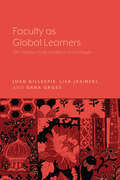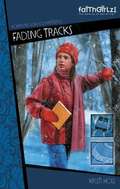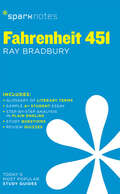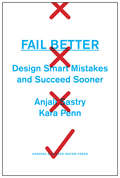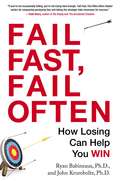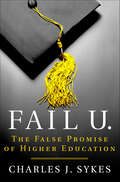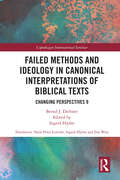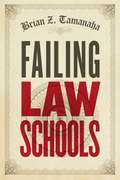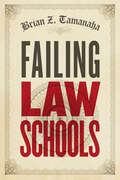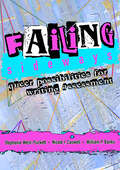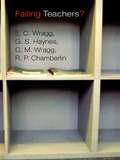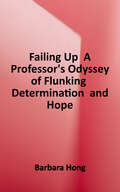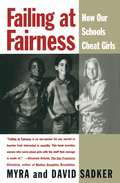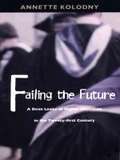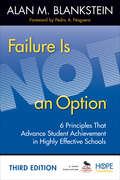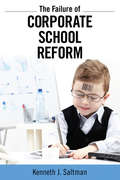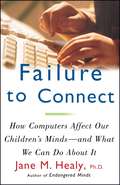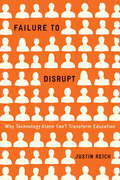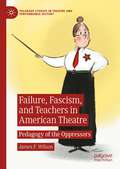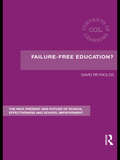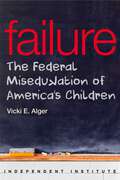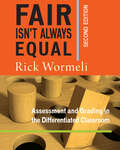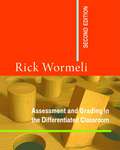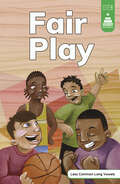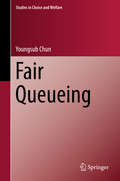- Table View
- List View
Faculty as Global Learners: Off-Campus Study at Liberal Arts Colleges
by Dana Gross Joan Gillespie Lisa JasinskiThis co-authored collection offers valuable insights about the impact of leading off-campus study on faculty leaders’ teaching, research, service, and overall well-being. Recognizing that faculty leaders are themselves global learners, the book addresses ways that liberal arts colleges can more effectively achieve their strategic goals for students' global learning by intentionally anticipating and supporting the needs of faculty leaders, as they grow and change. Faculty as Global Learners offers key findings and recommendations to stimulate conversations among administrators, faculty, and staff about concrete actions they can explore and steps they can take on their campuses to both support faculty leaders of off-campus programs and advance strategic institutional goals for global learning. This collection includes transferrable pedagogical insights and the perspectives of faculty members who have led off-campus study programs in a variety of disciplines and geographic regions.
Fading Tracks (Boarding School Mystery #1)
by Kristi D. HollWhen the Landmark School for Girls' van carrying an art teacher and six students disappears near an ice-covered lake on the way back from a field trip, twelve-year-old Jeri desperately wants to help but everything she tries seems to make the situation worse.
Fahrenheit 451 SparkNotes Literature Guide (SparkNotes Literature Guide Series)
by Ray Bradbury SparkNotesFahrenheit 451 SparkNotes Literature Guide by Ray Bradbury Making the reading experience fun! When a paper is due, and dreaded exams loom, here's the lit-crit help students need to succeed! SparkNotes Literature Guides make studying smarter, better, and faster. They provide chapter-by-chapter analysis; explanations of key themes, motifs, and symbols; a review quiz; and essay topics. Lively and accessible, SparkNotes is perfect for late-night studying and paper writing. Includes:An A+ Essay—an actual literary essay written about the Spark-ed book—to show students how a paper should be written.16 pages devoted to writing a literary essay including: a glossary of literary termsStep-by-step tutoring on how to write a literary essayA feature on how not to plagiarize
Fail Better: Design Smart Mistakes and Succeed Sooner
by Anjali Sastry Kara PennIf you’re aiming to innovate, failure along the way is a given. But can you fail better? Whether you’re rolling out a new product from a city-view office or rolling up your sleeves to deliver a social service in the field, learning why and how to embrace failure can help you do better, faster. Smart leaders, entrepreneurs, and change agents design their innovation projects with a key idea in mind: ensure that every failure is maximally useful. In Fail Better, Anjali Sastry and Kara Penn show how to create the conditions, culture, and habits to systematically, ruthlessly, and quickly figure out what works, in three steps: 1. Launch every innovation project with the right groundwork 2. Build and refine ideas and products through iterative action 3. Identify and embed the learning Fail Better teaches you how to design your efforts to test the boundaries of your thinking, explore crucial interdependencies, and find the factors that can shift results from just acceptable to groundbreaking-or even world-changing. Practical instructions intertwined with compelling real-world examples show you how to: Make predictions and map system relationships ahead of time so you can better assess results Establish how much failure you can afford Prioritize project activities for disconfirmation and iteration Learn from every action step by collecting and examining the right data Support efficient, productive habits to link action and reflection Distill, share, and embed the lessons from every success and failure You may be a Fortune 500 manager, scrappy start-up innovator, social impact visionary, or simply leading your own small project. If you aim to break through without breaking the bank-or ruining your reputation-this book is for you.
Fail Fast, Fail Often
by Ryan BabineauxWhat if your biggest mistake is that you never make mistakes? Ryan Babineaux and John Krumboltz, psychologists, career counselors, and creators of the popular Stanford University course "Fail Fast, Fail Often,” have come to a compelling conclusion: happy and successful people tend to spend less time planning and more time acting. They get out into the world, try new things, and make mistakes, and in doing so, they benefit from unexpected experiences and opportunities. Drawing on the authors’ research in human development and innovation, Fail Fast, Fail Often shows readers how to allow their enthusiasm to guide them, to act boldly, and to leverage their strengths-even if they are terrified of failure. .
Fail U.: The False Promise of Higher Education
by Charles J. SykesThe cost of a college degree has increased by 1,125% since 1978—four times the rate of inflation. Total student debt has surpassed $1.3 trillion. Nearly two thirds of all college students must borrow to study, and the average student graduates with more than $30,000 in debt. Many college graduates under twenty-five years old are unemployed or underemployed. And professors—remember them?—rarely teach undergraduates at many major universities, instead handing off their lecture halls to cheaper teaching assistants.So, is it worth it? That’s the question Charles J. Sykes attempts to answer in Fail U., exploring the staggering costs of a college education, the sharp decline in tenured faculty and teaching loads, the explosion of administrative jobs, the grandiose building plans, and the utter lack of preparedness for the real world that many now graduates face. Fail U. offers a different vision of higher education; one that is affordable, more productive, and better-suited to meet the needs of a diverse range of students—and one that will actually be useful in their future careers and lives.
Failed Methods and Ideology in Canonical Interpretation of Biblical Texts: Changing Perspectives 9 (Copenhagen International Seminar Ser.)
by Bernd DiebnerThis volume by the late Bernd J. Diebner presents an anthology of studies previously published only in German from 1971 to 2020 on a wide range of topics in biblical studies. The 18 essays in this collection offer profound insight into the works of German scholarship which have strongly influenced biblical studies and related research in the 20th century. Being an important, but lesser recognized ‘member’ of the Copenhagen school, Diebner voiced serious criticism of contemporary biblical scholarship which is discussed in the first seven chapters. The remaining chapters offer challenging new perspectives on well-known themes, narratives, and compositions related to history, ideology, and archaeology, on the one hand, and text and canon, on the other, as alternatives to traditional historical–critical approaches. Now published in English for the first time, this volume makes these essays available to Anglophone students and scholars of biblical and ancient Near Eastern studies.
Failing Law Schools
by Brian Z. TamanahaOn the surface, law schools today are thriving. Enrollments are on the rise, and their resources are often the envy of every other university department. Law professors are among the highest paid and play key roles as public intellectuals, advisers, and government officials. Yet behind the flourishing facade, law schools are failing abjectly. Recent front-page stories have detailed widespread dubious practices, including false reporting of LSAT and GPA scores, misleading placement reports, and the fundamental failure to prepare graduates to enter the profession. Addressing all these problems and more in a ringing critique is renowned legal scholar Brian Z. Tamanaha. Piece by piece, Tamanaha lays out the how and why of the crisis and the likely consequences if the current trend continues. The out-of-pocket cost of obtaining a law degree at many schools now approaches $200,000. The average law school graduate's debt is around $100,000--the highest it has ever been--while the legal job market is the worst in decades, with the scarce jobs offering starting salaries well below what is needed to handle such a debt load. At the heart of the problem, Tamanaha argues, are the economic demands and competitive pressures on law schools--driven by competition over U. S. News and World Report ranking. When paired with a lack of regulatory oversight, the work environment of professors, the limited information available to prospective students, and loan-based tuition financing, the result is a system that is fundamentally unsustainable. Growing concern with the crisis in legal education has led to high-profile coverage in the Wall Street Journal and the New York Times, and many observers expect it soon will be the focus of congressional scrutiny. Bringing to the table his years of experience from within the legal academy, Tamanaha has provided the perfect resource for assessing what's wrong with law schools and figuring out how to fix them.
Failing Law Schools (Chicago Series in Law and Society)
by Brian Z. TamanahaOn the surface, law schools today are thriving. Enrollments are on the rise, and their resources are often the envy of every other university department. Law professors are among the highest paid and play key roles as public intellectuals, advisers, and government officials. Yet behind the flourishing facade, law schools are failing abjectly. Recent front-page stories have detailed widespread dubious practices, including false reporting of LSAT and GPA scores, misleading placement reports, and the fundamental failure to prepare graduates to enter the profession.Addressing all these problems and more in a ringing critique is renowned legal scholar Brian Z. Tamanaha. Piece by piece, Tamanaha lays out the how and why of the crisis and the likely consequences if the current trend continues. The out-of-pocket cost of obtaining a law degree at many schools now approaches $200,000. The average law school graduate’s debt is around $100,000—the highest it has ever been—while the legal job market is the worst in decades, with the scarce jobs offering starting salaries well below what is needed to handle such a debt load. At the heart of the problem, Tamanaha argues, are the economic demands and competitive pressures on law schools—driven by competition over U.S. News and World Report ranking. When paired with a lack of regulatory oversight, the work environment of professors, the limited information available to prospective students, and loan-based tuition financing, the result is a system that is fundamentally unsustainable.Growing concern with the crisis in legal education has led to high-profile coverage in the Wall Street Journal and the New York Times, and many observers expect it soon will be the focus of congressional scrutiny. Bringing to the table his years of experience from within the legal academy, Tamanaha has provided the perfect resource for assessing what’s wrong with law schools and figuring out how to fix them.
Failing Sideways: Queer Possibilities for Writing Assessment
by William P. Banks Nicole I. Caswell Stephanie West-PuckettFailing Sideways is an innovative and fresh approach to assessment that intersects writing studies, educational measurement, and queer rhetorics. While valuing and representing the research, theory, and practice of assessment, authors Stephanie West-Puckett, Nicole I. Caswell, and William P. Banks demonstrate the ways that students, teachers, and other interested parties can find joy and justice in the work of assessment. A failure-oriented assessment model unsettles some of the most common practices, like rubrics and portfolios, and challenges many deeply held assumptions about validity and reliability in order to ask what could happen if assessment was oriented toward possibility and potential. Working to engage a more capacious writing construct, the authors propose queer validity inquiry (QVI) as a model for assessment that values failure, affect, identity, and materiality. These overlapping lenses help teachers honor parts of writing and learning that writing studies faculty have struggled to hold onto in a world overly focused on quickness and efficiency in schools. Through programmatic and classroom examples, Failing Sideways privileges what is valued in the classroom but traditionally ignored in assessments. Reimagining what matters in the teaching and learning of writing and using assessment data differently, this book demonstrates what writing can be and could do in a more diverse and just world.
Failing Teachers?
by Prof E Wragg E.C. Wragg R.P. Chamberlin G.S. HaynesFirst published in 1999. Routledge is an imprint of Taylor & Francis, an informa company.
Failing Up: A Professor's Odyssey of Flunking, Determination, and Hope
by Barbara HongThis book was recognized as one of only 2% of books reviewed to earn a Kirkus STAR—the most prestigious designation in the book industry in awarding books of exceptional merit. <p><p>When people first meet Barbara Hong, they often conclude that her life must have always been enriched. They assume she had loving, successful parents and all the support she needed to reach her goals. Nothing could be further from the truth. <p><p>Hong’s path to an Ivy League university and beyond started in a filthy tenement in Singapore where she lived with an abusive father and an illiterate mother. Even as a child of six, she worked in her sweatshop home to help with extra money, which her father often wasted on alcohol. As she endured his drinking and abuse, she feared that the pain she internalized could shatter her. But instead of falling apart, Hong managed to escape her misery, thanks to a teacher who believed in her. Once she knew she wasn’t the brainless “cabbage head” her mother called her, she began excelling as a student, eventually finding the courage to leave her home and discover her true calling as a knowledge seeker, educator, and an advocate. <p><p>Hong’s inspirational journey from a sweatshop home upbringing to an influential dean and professor movingly illustrates the true strength of the human spirit and the power of teachers.
Failing at Fairness
by Myra Sadker David SadkerFailing at Fairness, the result of two decades of research, shows how gender bias makes it impossible for girls to receive an education equal to that given to boys. Girls' learning problems are not identified as often as boys' are Boys receive more of their teachers' attention Girls start school testing higher in every academic subject, yet graduate from high school scoring 50 points lower than boys on the SAT Hard-hitting and eye-opening, Failing at Fairness should be read by every parent, especially those with daughters.
Failing the Future: A Dean Looks at Higher Education in the Twenty-first Century
by Annette KolodnyBoth revealing and compelling, Annette Kolodny's Failing the Future: A Dean Looks at Higher Education in the Twenty-first Century is drawn from the author's experience as a distinguished teacher, a prize-winning scholar of American literature, a feminist thinker, and an innovative administrator at a major public university. In chapters that range from the changing structure of the American family and its impact on both curriculum and university benefits policies to recommendations for overhauling the culture of decision making on campus, this former Dean of the College of Humanities at the University of Arizona explores the present state of higher education and offers a sobering view of what lies ahead.In this volume Kolodny explains the reasons for the financial crisis in higher education today and boldly addresses the challenges that remain ignored, including rising birthrates, changing demographics both on campus and across the country, the accelerating globalization of higher education and advanced research, and the necessity for greater interdisciplinarity in undergraduate education. Moreover, while sensitive to the complex burdens placed on faculty today, Kolodny nonetheless reveals how the professoriate has allowed itself to become vulnerable to public misperceptions and to lampooning by the media.Not simply a book about current problems and future challenges, Failing the Future is rich with practical solutions and workable programs for change. Among her many insights, Kolodny offers a thorough defense of the role of tenure and outlines a new set of procedures to ensure its effective implementation; she proposes a structure for an "Antifeminist Intellectual Harassment Policy"; and she provides a checklist of family-sensitive policies universities can offer their staff, faculty, and administrators. Kolodny calls on union leaders, campus communities, policymakers, and the general public to work together in unprecedented partnerships. Her goal, as she states in a closing coda, is to initiate a revitalized conversation about public education.This book should be required reading for all those concerned with the future of higher education in this country--from college trustees to graduate students entering the professoriate, from faculty to university administrators, from officers of campus-based unions to education policymakers.
Failure Is Not an Option: 6 Principles That Advance Student Achievement in Highly Effective Schools
by Alan M. BlanksteinSchool improvement that lasts: find out how with this masterful guide! New case studies and field-tested tools and techniques uncover indispensible insights in the powerful third edition of this bestseller. Discover why more than 350,000 educators have used this book to create schools that sustain success for every student. Build high-performing leadership teams across schools and districts through: Engagement strategies and capacity-building questions to help staff and students target meaningful goals New real-world examples to help stakeholders maintain collaborative cultures in the face of new teacher evaluations and merit pay, RTI and Common Core mandates, and diverse settings New tools, forms, and video segments on a companion website
Failure of Corporate School Reform (Critical Interventions)
by Kenneth J. SaltmanCorporate school reforms, especially privatization, union busting, and high-stakes testing have been hailed as the last best hope for public education. Yet, as Kenneth Saltman powerfully argues in this new book, corporate school reforms have decisively failed to deliver on what their proponents have promised for two decades: higher test scores and lower costs. As Saltman illustrates, the failures of corporate school reform are far greater and more destructive than they seem. Left unchecked, corporate school reform fails to challenge and in fact worsens the most pressing problems facing public schooling, including radical funding inequalities, racial segregation, and anti-intellectualism. But it is not too late for change. Against both corporate school reformers and its liberal critics, this book argues for the expansion of democratic pedagogies and a new common school movement that will lead to broader social renewal.
Failure to Connect: How Computers Affect Our Children's Minds and What We Can Do About It
by Jane M. HealyIn this comprehensive, practical, and unsettling look at computers in children's lives, Jane M. Healy, Ph.D., questions whether computers are really helping or harming children's development. Once a bedazzled enthusiast of educational computing but now a troubled skeptic, Dr. Healy examines the advantages and drawbacks of computer use for kids at home and school, exploring its effects on children's health, creativity, brain development, and social and emotional growth. Today, the Federal Government allocates scarce educational funding to wire every classroom to the Internet, software companies churn out "educational" computer programs even for preschoolers, and school administrators cut funding and space for books, the arts, and physical education to make room for new computer hardware. It is past the time to address these issues. Many parents and even some educators have been sold on the idea that computer literacy is as important as reading and math. Those who haven't hopped on the techno bandwagon are left wondering whether they are shortchanging their children's education or their students' futures. Few people stop to consider that computers, used incorrectly, may do far more harm than good. New technologies can be valuable educational tools when used in age-appropriate ways by properly trained teachers. But too often schools budget insufficiently for teacher training and technical support. Likewise, studies suggest that few parents know how to properly assist children's computer learning; much computer time at home may be wasted time, drawing children away from other developmentally important activities such as reading, hobbies, or creative play. Moreover, Dr. Healy finds that much so-called learning software is more "edutainment" than educational, teaching students more about impulsively pointing and clicking for some trivial goal than about how to think, to communicate, to imagine, or to solve problems. Some software, used without careful supervision, may also have the potential to interrupt a child's internal motivation to learn. Failure to Connect is the first book to link children's technology use to important new findings about stages of child development and brain maturation, which are clearly explained throughout. It illustrates, through dozens of concrete examples and guidelines, how computers can be used successfully with children of different age groups as supplements to classroom curricula, as research tools, or in family projects. Dr. Healy issues strong warnings, however, against too early computer use, recommending little or no exposure before age seven, when the brain is primed to take on more abstract challenges. She also lists resources for reliable reviews of child-oriented software, suggests questions parents should ask when their children are using computers in school, and discusses when and how to manage computer use at home. Finally, she offers a thoughtful look at the question of which skills today's children will really need for success in a technological future -- and how they may best acquire them. Based on years of research into learning and hundreds of hours of interviews and observations with school administrators, teachers, parents, and students, Failure to Connect is a timely and eye-opening examination of the central questions we must confront as technology increasingly influences the way we educate our children.
Failure to Disrupt: Why Technology Alone Can’t Transform Education
by Justin ReichA leader in educational technology separates truth from hype, explaining what tech can—and can’t—do to transform our classrooms.Proponents of large-scale learning have boldly promised that technology can disrupt traditional approaches to schooling, radically accelerating learning and democratizing education. Much-publicized experiments, often underwritten by Silicon Valley entrepreneurs, have been launched at elite universities and in elementary schools in the poorest neighborhoods. Such was the excitement that, in 2012, the New York Times declared the “year of the MOOC.” Less than a decade later, that pronouncement seems premature.In Failure to Disrupt: Why Technology Alone Can’t Transform Education, Justin Reich delivers a sobering report card on the latest supposedly transformative educational technologies. Reich takes readers on a tour of MOOCs, autograders, computerized “intelligent tutors,” and other educational technologies whose problems and paradoxes have bedeviled educators. Learning technologies—even those that are free to access—often provide the greatest benefit to affluent students and do little to combat growing inequality in education. And institutions and investors often favor programs that scale up quickly, but at the expense of true innovation. It turns out that technology cannot by itself disrupt education or provide shortcuts past the hard road of institutional change.Technology does have a crucial role to play in the future of education, Reich concludes. We still need new teaching tools, and classroom experimentation should be encouraged. But successful reform efforts will focus on incremental improvements, not the next killer app.
Failure, Fascism, and Teachers in American Theatre: Pedagogy of the Oppressors (Palgrave Studies in Theatre and Performance History)
by James F. WilsonThis timely and accessible book explores the shifting representations of schoolteachers and professors in plays and performances primarily from the twentieth and twenty-first centuries in the United States. Examining various historical and recurring types, such as spinsters, schoolmarms, presumed sexual deviants, radicals and communists, fascists, and emasculated men teachers, Wilson shines the spotlight on both well-known and nearly-forgotten plays. The analysis draws on a range of scholars from cultural and gender studies, queer theory, and critical race discourses to consider teacher characters within notable education movements and periods of political upheaval. Richly illustrated, the book will appeal to theatre scholars and general readers as it delves into plays and performances that reflect cultural fears, desires, and fetishistic fantasies associated with educators. In the process, the scrutiny on the array of characters may help illuminate current attacks on real-life teachers while providing meaningful opportunities for intervention in the ongoing education wars.
Failure-Free Education?: The Past, Present and Future of School Effectiveness and School Improvement (Contexts of Learning)
by David ReynoldsDavid Reynolds is recognised internationally as one of the leaders of the school effectiveness and school improvement movement, and Failure Free Education? brings together for the first time many of his most influential and provocative pieces. Drawing on the author’s work from over three decades, these extracts from his seminal books, chapters, papers and articles combine to give a unique overview of how the movement developed, the problems involved in the application of the knowledge and the disciplines’ potentially glittering future now. The book also covers the issues raised by, and lessons learned from, his close involvement with English government educational policymaking from the mid 1990s to date. This book is essential reading for those who seek to understand how we can make every school a good school, and what the obstacles may be to achieving that goal.
Failure: The Federal Miseducation of America's Children
by Vicki E. AlgerA comprehensive account and frank assessment of federal involvement in education is long overdue. Education policy expert Vicki E. Alger remedies this deficiency with her book, Failure: The Federal Miseducation of America&’s Children.As its title indicates, Failure makes no effort to sugar coat its findings: Created in 1979, after a lobbying campaign that spanned generations, the Department of Education has failed to live up to its promises. Federal involvement—whether related to testing, funding, or academic curricula—has failed to abide by the Constitution&’s implication that education must remain the domain only of state and local governments and private institutions. Most of all, the central government&’s pervasive meddling in education has failed America&’s school children and their parents. Education policy has long been mired in controversies, often with opposing sides missing the mark. Failure helps us step back from the skirmish du jour and redirects our focus to the big picture, showing us what&’s gone wrong over the decades and the institutional causes of these failures. It also offers a bold blueprint for returning the federal government to its constitutional role and for cultivating an educational system that meets the needs of students and parents, rather than bureaucrats. Concerned citizens of every stripe will benefit from Failure&’s history of federal education policy, its brutally honest report card for the Department of Education, its look at education systems across the globe, and its ambitious policy recommendations. Failure might even succeed in reframing the way the federal education establishment thinks about education policy.
Fair Isn't Always Equal: Assessment & Grading in the Differentiated Classroom
by Rick WormeliDifferentiated instruction is a nice idea, but what happens when it comes to assessing and grading students? How can you capture student progress, growth, and soft skill development and still provide an equitable grading environment?' An internationally recognized expert on grading practices, author Rick Wormeli revisits these questions in this thoroughly updated second edition of Fair Isn' t Always Equal: Assessment and Grading in the Differentiated Classroom.' Wormeli reflects on current grading and assessment practices and how they can exist with high-stakes, accountable classrooms. Important and sometimes controversial issues are tackled constructively in this book, incorporating modern pedagogy and addressing the challenges of teaching diverse groups of students across all learning levels.' Middle- and high-school educators will easily recognize' gray areas of grading and how important it is to have a shared school vision. In this second edition, new sections address sports eligibility, honor roll, descriptive feedback techniques, and gifted/talented students.' Previous chapters on test questions, redos/retakes, grading scales, and grading effort and behavior have been revised extensively. This important book clearly explains the principles behind best grading practices so that you' re ready for all grading questions or scenarios that you may encounter in your classrooms and schools.
Fair Isn't Always Equal: Assessment and Grading in the Differentiated Classroom
by Rick WormeliDifferentiated instruction is a nice idea, but what happens when it comes to assessing and grading students? What's both fair and leads to real student learning? An internationally recognized expert on grading practices, Rick Wormeli first examined these questions 10 years ago in the first edition of Fair Isn't Always Equal. In this thoroughly updated second edition, Rick provides a catalyst for serious reflection on current grading and assessment practices in differentiated classrooms. Coherent and effective standards-based grading practices for a high-stakes, accountability-focused world is also outlined. Recognizing the importance of having a shared school vision for assessment and grading, Rick addresses the challenges for teachers and administrators alike. Middle- and high-school educators will easily recognize real examples and gray areas of grading. Rick tackles important and sometimes controversial assessment and grading issues constructively, incorporating modern pedagogy and the challenges of working with diverse groups of students. New sections address sports eligibility, honor roll, descriptive feedback techniques, and gifted/talented students, and chapters on test questions, redos/retakes, grading scales, and grading effort and behavior have been revised extensively. This important book clearly explains the principles behind best grading practices so that you're ready for all grading questions or scenarios that you may encounter in your classrooms and schools.
Fair Play (Stairway Decodables Step 6)
by Leanna KochPlaying basketball in the gym after school is a blast! But when a new friend joins the group, his constant fouls ruin the game for everyone. Will the boys find a way to make basketball fun again? Stairway Decodables is a supplemental phonics resource that’s perfect for supporting small group instruction, independent reading, or reading practice at home. This title provides practice in decoding words with vowel-r combinations.
Fair Queueing
by Youngsub ChunThis monograph provides a detailed analysis on fair queueing rules from a normative, a strategic, and a non-cooperative viewpoint. The queueing problem is concerned with the following situation: There is a group of agents who must be served in a facility. The facility can handle only one agent at a time and agents incur waiting costs. The problem is to find the order in which to serve agents and monetary transfers they should receive. The queueing problem has been studied extensively in the recent literature.
